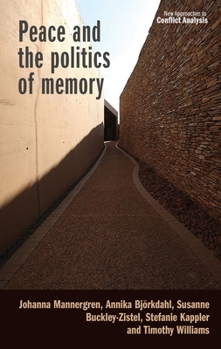Peace and the Politics of Memory
This important book provides new understandings of how the politics of memory impacts peace in societies transitioning from a violent past. It does so by developing a theoretical approach focusing on the intersection of sites, agency, narratives, and events in memory-making. Drawing on rich empirical studies of mnemonic formations in Cyprus, Bosnia and Herzegovina, Rwanda, South Africa and Cambodia, the book speaks to a broad audience. The in-depth, cross-case analysis shows that inclusivity, pluralism, and dignity in memory politics are key to the construction of a just peace. The book contributes crucial and timely knowledge about societies that grapple with the painful legacies of the past and advances the study of memory and peace.
An electronic edition of this book is freely available under a Creative Commons (CC BY-NC-ND) licence.Format:Hardcover
Language:English
ISBN:1526178311
ISBN13:9781526178312
Release Date:July 2024
Publisher:Manchester University Press
Length:256 Pages
Weight:1.18 lbs.
Dimensions:0.6" x 6.1" x 9.2"
Customer Reviews
0 rating





